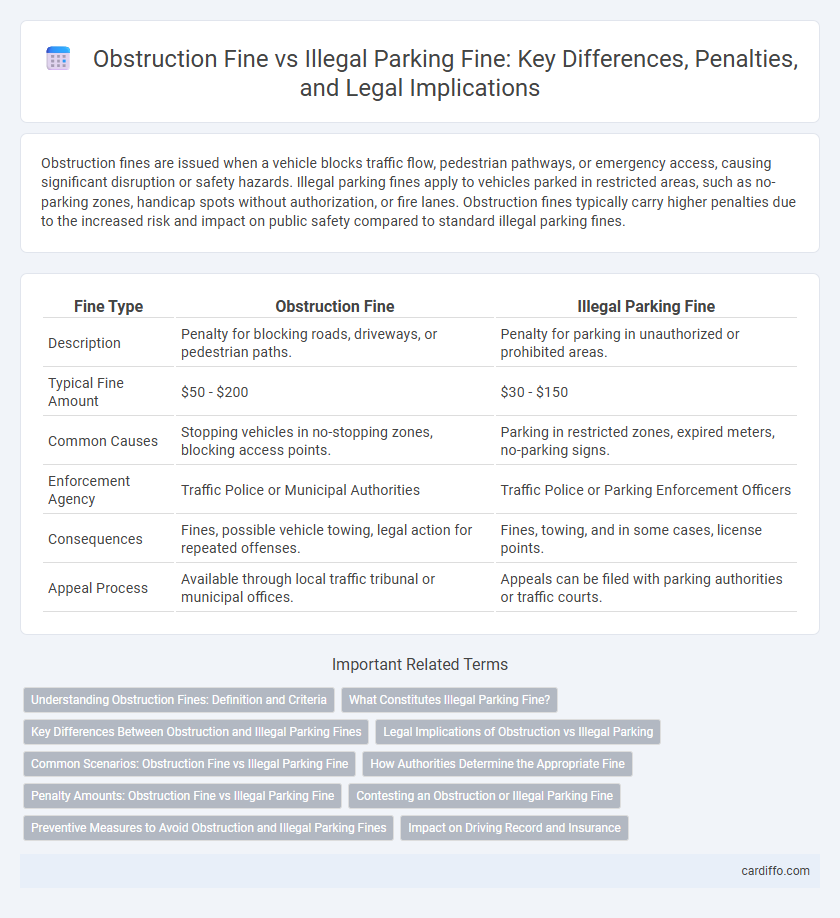Obstruction fines are issued when a vehicle blocks traffic flow, pedestrian pathways, or emergency access, causing significant disruption or safety hazards. Illegal parking fines apply to vehicles parked in restricted areas, such as no-parking zones, handicap spots without authorization, or fire lanes. Obstruction fines typically carry higher penalties due to the increased risk and impact on public safety compared to standard illegal parking fines.
Table of Comparison
| Fine Type | Obstruction Fine | Illegal Parking Fine |
|---|---|---|
| Description | Penalty for blocking roads, driveways, or pedestrian paths. | Penalty for parking in unauthorized or prohibited areas. |
| Typical Fine Amount | $50 - $200 | $30 - $150 |
| Common Causes | Stopping vehicles in no-stopping zones, blocking access points. | Parking in restricted zones, expired meters, no-parking signs. |
| Enforcement Agency | Traffic Police or Municipal Authorities | Traffic Police or Parking Enforcement Officers |
| Consequences | Fines, possible vehicle towing, legal action for repeated offenses. | Fines, towing, and in some cases, license points. |
| Appeal Process | Available through local traffic tribunal or municipal offices. | Appeals can be filed with parking authorities or traffic courts. |
Understanding Obstruction Fines: Definition and Criteria
Obstruction fines are penalties imposed when a vehicle blocks access or disrupts traffic flow, such as parking in front of driveways, narrow streets, or emergency exits. These fines differ from illegal parking fines, which typically address violations like parking in unauthorized zones or exceeding time limits. Understanding the specific criteria for obstruction fines helps ensure compliance with traffic regulations and maintains public safety.
What Constitutes Illegal Parking Fine?
Illegal parking fines are imposed when a vehicle is parked in violation of traffic laws, such as parking in no-parking zones, blocking fire hydrants, or parking in spaces reserved for disabled individuals without proper authorization. These fines are specifically designed to address breaches of designated parking rules that disrupt traffic flow or safety regulations. Unlike obstruction fines, illegal parking fines target unauthorized or prohibited parking rather than the act of physically blocking roadways or access points.
Key Differences Between Obstruction and Illegal Parking Fines
Obstruction fines are issued when a vehicle blocks driveways, access points, or emergency routes, posing safety risks and disrupting traffic flow. Illegal parking fines apply to vehicles parked in prohibited zones such as no-parking areas, bus stops, or handicapped spaces without authorization. The key difference lies in obstruction fines targeting vehicles that impede movement or access, while illegal parking fines penalize unauthorized or forbidden parking locations regardless of obstruction.
Legal Implications of Obstruction vs Illegal Parking
Obstruction fines carry stricter legal consequences as they involve blocking access to public ways or emergency routes, potentially leading to higher penalties and even criminal charges in severe cases. Illegal parking fines primarily address unauthorized vehicle placement in restricted areas, resulting in monetary penalties without criminal implications. Courts often view obstruction as a more serious offense due to its impact on public safety and accessibility.
Common Scenarios: Obstruction Fine vs Illegal Parking Fine
Common scenarios for obstruction fines include blocking driveways, fire hydrants, or pedestrian crossings, causing safety hazards or traffic delays. Illegal parking fines typically arise from parking in no-parking zones, exceeding time limits, or parking without a valid permit. Understanding these distinctions helps drivers avoid specific violations and the associated penalties in urban areas.
How Authorities Determine the Appropriate Fine
Authorities determine obstruction fines by assessing whether a vehicle blocks access to driveways, fire hydrants, or emergency routes, emphasizing the severity and potential hazard caused. Illegal parking fines result from violations such as parking in no-parking zones, exceeding time limits, or parking without a valid permit, verified through signage and regulations. Enforcement officers rely on specific traffic laws and the location's rules to classify the offense and apply the corresponding fine.
Penalty Amounts: Obstruction Fine vs Illegal Parking Fine
Obstruction fines typically impose higher penalty amounts compared to illegal parking fines due to the increased risk and disruption they cause, often ranging from $150 to $500 or more. Illegal parking fines generally vary between $50 and $200 depending on the severity and location. Enforcement agencies prioritize obstruction violations with steeper fines to discourage blocking traffic flow, emergency access, or pedestrian pathways.
Contesting an Obstruction or Illegal Parking Fine
Contesting an obstruction fine requires providing evidence that the vehicle was not blocking access or causing a hazard, such as photographs or witness statements. For illegal parking fines, presenting proof of valid parking permits, unclear signage, or payment receipts can support your case. Understanding local traffic regulations and submitting a formal appeal within the specified timeframe is crucial for effectively challenging either fine.
Preventive Measures to Avoid Obstruction and Illegal Parking Fines
Maintaining clear access by parking only in designated areas and adhering to local traffic regulations significantly reduces the risk of obstruction and illegal parking fines. Utilizing signage awareness and avoiding double parking near driveways or fire hydrants prevents violations and ensures smooth traffic flow. Implementing preventive measures such as timely payment at meters and parking within marked zones helps drivers avoid costly penalties related to obstruction and illegal parking.
Impact on Driving Record and Insurance
Obstruction fines typically result in points on a driving record, which can increase insurance premiums significantly due to the perceived higher risk. Illegal parking fines usually do not add points and have a minimal direct effect on insurance rates, as they are considered minor traffic violations. Drivers with obstruction fines may face long-term financial consequences, while illegal parking fines primarily lead to immediate monetary penalties without affecting driving history.
Obstruction Fine vs Illegal Parking Fine Infographic

 cardiffo.com
cardiffo.com